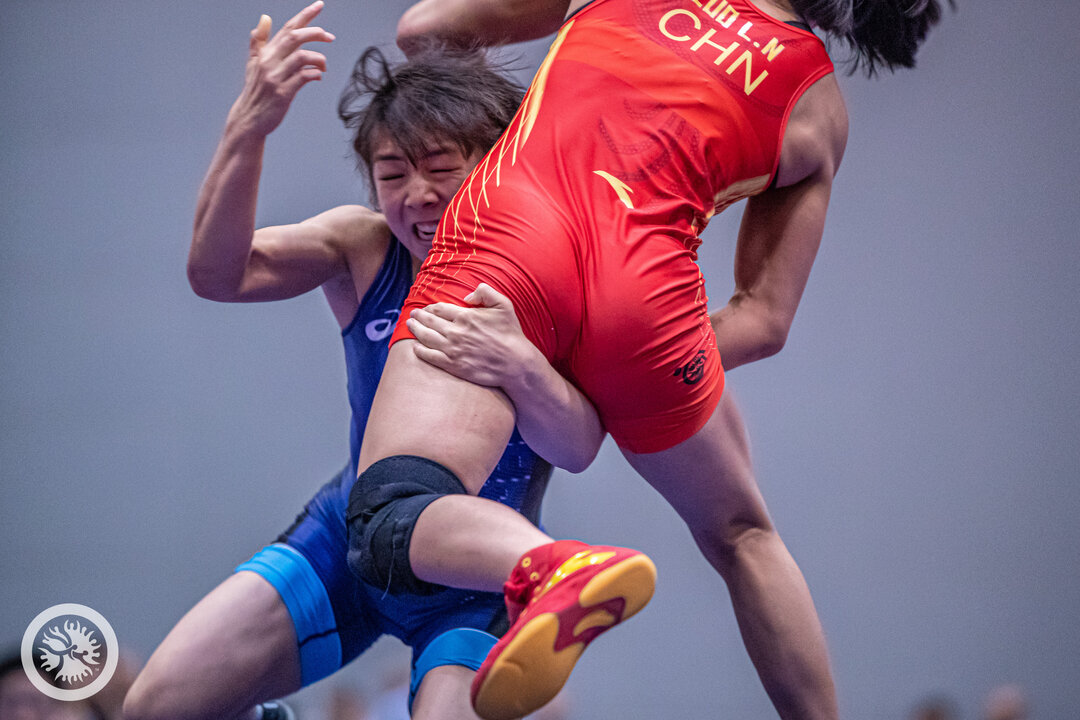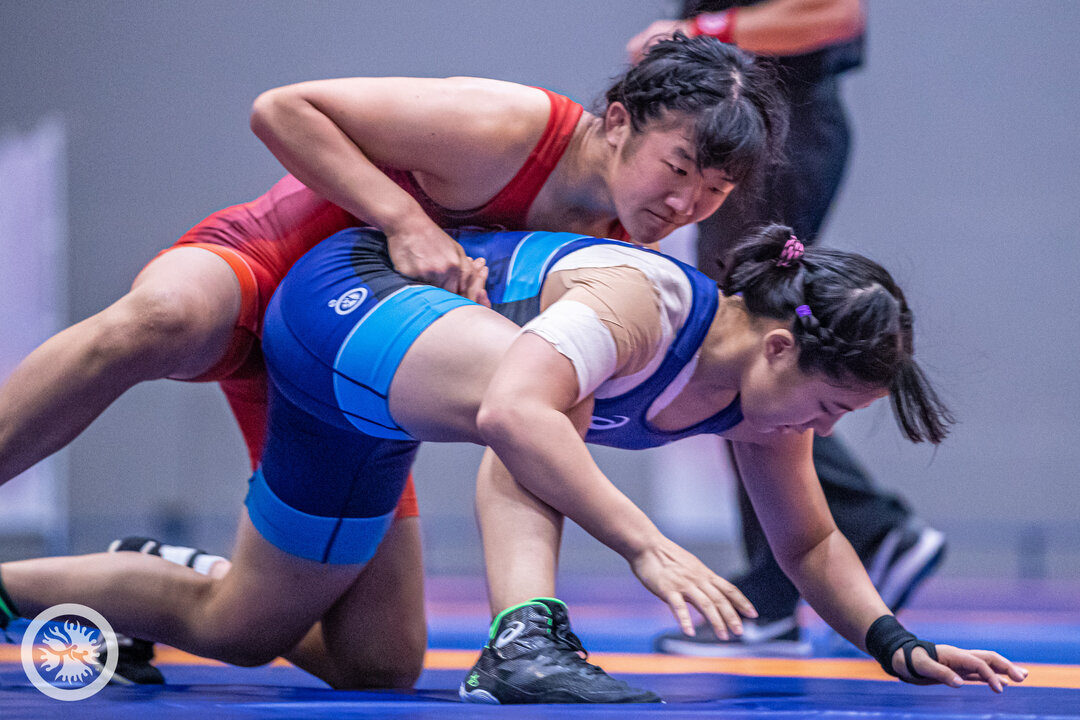#WrestleTokyo Olympic Games Preview: 68kg
Friday, July 23, 2021 - 20:26 By Ken Marantz

TOKYO, Japan (July 23) -- Many athletes might cringe at the near-monastic life awaiting them under the harsh pandemic protocols at the Olympics. Tamyra MENSAH-STOCK (USA) can't wait.
"I'm going to be fine," Mensah-Stock told the Japanese press at the U.S. team's pre-Olympic camp in central Japan. "I'm a homebody. I play video games, I karaoke, I literally stay at home when I'm in the States. This is what I love. This is perfect."
That only spells more trouble for the others in the women's 68kg weight class, where the 28-year-old Mensah-Stock heads into her Olympic debut in Tokyo as the reigning world champion and the No. 1 seed, and on quite a roll.
Mensah-Stock's main competition looks to come from unseeded opponents -- the two fifth-place finishers at the 2019 World Championships, Alla CHERKASOVA (UKR) and 2016 Rio Olympic champion Sara DOSHO (JPN), as well as Asian qualifier Feng ZHOU (CHN) and two-time former world champion Battsetseg SORONZONBOLD (MGL), a bronze medalist at the 2012 London Olympics.
Since her triumph at the 2019 worlds in Nur-Sultan, Mensah-Stock has lost just one match in international competition.
After winning all three of her matches at the 2019 World Cup, she finished second at 2020 Matteo Pellicone tournament. In Rome, Mensah-Stock defeated both Blessing OBORUDUDU (NGR) and Koumba LARROQUE (FRA) -- who are the Nos. 2 and 3 seeds in Tokyo, respectively -- en route to the final, where she dropped a 8-8 decision to China's Zhou after leading 8-0 with two minutes to go.
The American rebounded from that setback with titles at the 2020 and 2021 Pan American Championships, which sandwiched golds at the Grand Prix de France and the Matteo Pellicone in 2021.
Although Mensah-Stock goes in as the favorite, she knows she can't take anything for granted.
"I just have to stay tough and have a strong mindset," she said. "I wouldn't say I'm worried about all of them, but I've got to stay on my guard. Because at any point in time, something can happen."
Asked what drives her to seek the gold medal, she replied, "I need to showcase what I have. God has given me so much talent, I have to go out there and showcase what he has given me, and I feel like he has given me enough talent to reach gold. So I've got to go and shine my light, just blind everybody with all my talent, if I can."
Naturally optimistic and outgoing, Mensah-Stock took the postponement of the Olympics in stride.
"I was bummed, but I knew that it was only going to be postponed, I knew it wasn't going to be canceled," she said. "So I was actually kind of happy as well, because I got spend more time with my husband and my dogs, and see my family a lot more. So it was kind of a super-vacation."
Her main rival for the gold at Makuhari Messe will likely be Dosho, who seemed to be cruising toward a succession of global titles when she suffered a serious left shoulder injury during a victory over Danielle LAPPAGE (CAN) at the 2018 World Cup that required surgery.
That kept the 26-year-old Japanese from defending the world title she had won the previous year, and even when she came back at the Japan championships at the end of 2018, she was not the force she once was, being reticent to use her left arm.
At the 2019 World Championships, Dosho hardly looked like an Olympic champion. She was completely overpowered by Mensah-Stock in a 10-1 drubbing in the quarterfinals, then squeaked by Oborududu in the repechage to make it to the bronze-medal match, where she lost 4-1 to Anna SCHELL (GER).
She could have clinched the Olympic berth she earned for Japan at Nur-Sultan by winning the national title in 2019, but suffered a left knee injury just before the tournament, and was unceremoniously ousted 9-2 by Miwa MORIKAWA (JPN) in the semifinals.
Her Olympic fate hung on a playoff between her and Morikawa, held in March 2020, which Dosho managed to win 3-1. Dosho then became one of those athletes who benefitted from the postponement of the Tokyo Games, because it gave her time for all of her injuries to heal.
"I was able to change my outlook, thinking this is a chance for my injuries to heal and to build up strength for the Olympics," Dosho told the Japan federation website.
Now healthy and with an expanded repertoire beyond the quick double-leg tackle she learned at the kids wrestling club run by late father of Saori YOSHIDA (JPN), Dosho heads into the Tokyo Olympics with renewed confidence.
"The previous time [in Rio] was my first Olympics and I just rolled with the punches," Dosho said. "I had no problems and I was able to easily qualify. This time, it didn't go like that. I thought, 'This was really tough.' But through my losses, I was able to get a true feel for my weaknesses, and I could think about what I need to do to win the next time. I feel I've really grown."
Prior to her loss in Nur-Sultan, Dosho had not tasted defeat since the 2015 World Championships, where she lost in the quarterfinals to Zhou before taking the bronze medal. She avenged that loss in the semifinals at the 2017 Asian Championships en route to the gold, and again in the final at the 2019 Asian Championships.
Asked to comment about a possible clash with Dosho, Mensah-Stock deferred. "Let's let the wrestling do all the talking," she said. "I don't really have any comments about any of my competitors. Let's just get out there, wrestle clean, wrestle hard, wrestle smart."
The 32-year-old Cherkasova, who will be appearing in her second Olympics, won the 2018 world title that Dosho missed, defeating Larroque in the final as Zhou and Mensah-Stock shared the bronze medals.
From 2017 up to the 2019 World Championships, Cherkasova medaled at 12 consecutive tournaments, but missed a bronze medal in Nur-Sultan when Soronzonbold scored a defensive takedown with 45 seconds left for a 2-2 win.
She has had mediocre run-up to Tokyo, however, as all she has to show from four tournaments is a bronze medal at the 2020 European Championships. At the 2020 Matteo Pellicone tournament, she lost to Zhou in the quarterfinals and Lappage in the repechage.
The 31-year-old Soronzonbold's better days appear to be behind her, but experience means she can never be fully discounted. Her world titles came back in 2010 and 2015, the latter with a win in the final over Risako KAWAI (JPN) who would go on to win the Olympic gold the following year.
China's Feng, 27, qualified for her second Olympics by winning the Asian Olympic qualifying tournament in April, which she preceded with a gold at the 2019 World Military Games and her victory over Mensah-Stock in the 2020 Matteo Pellicone final. She has two world medals, a bronze in 2018 and a silver in 2015.
Larroque, 22, is also a two-time world medalist. Having earned her ticket to Tokyo at the European Olympic qualifying tournament, she heads there on a bit of a roll, having won the European and Poland Open titles this year, the latter coming in a field that included eight entries at the Tokyo Olympics.
68kg
No. 1 Tamyra Mariama STOCK MENSAH (USA)
No. 2 Blessing OBORUDUDU (NGR)
No. 3 Koumba Selene Fanta LARROQUE (FRA)
No. 4 Anna Carmen SCHELL (GER)
Agnieszka Jadwiga WIESZCZEK KORDUS (POL)
Battsetseg SORONZONBOLD (MGL)
Alla CHERKASOVA (UKR)
Sara DOSHO (JPN)
Enas Mostafa Youssef Khourshed AHMED (EGY)
Danielle Suzanne LAPPAGE (CAN)
Yudari SANCHEZ RODRIGUEZ (CUB)
Khanum VELIEVA (RUS)
Feng ZHOU (CHN)
Meerim ZHUMANAZAROVA (KGZ)
Mimi HRISTOVA (BUL)
Elis MANOLOVA (AZE)




Share your thoughts.
Comments